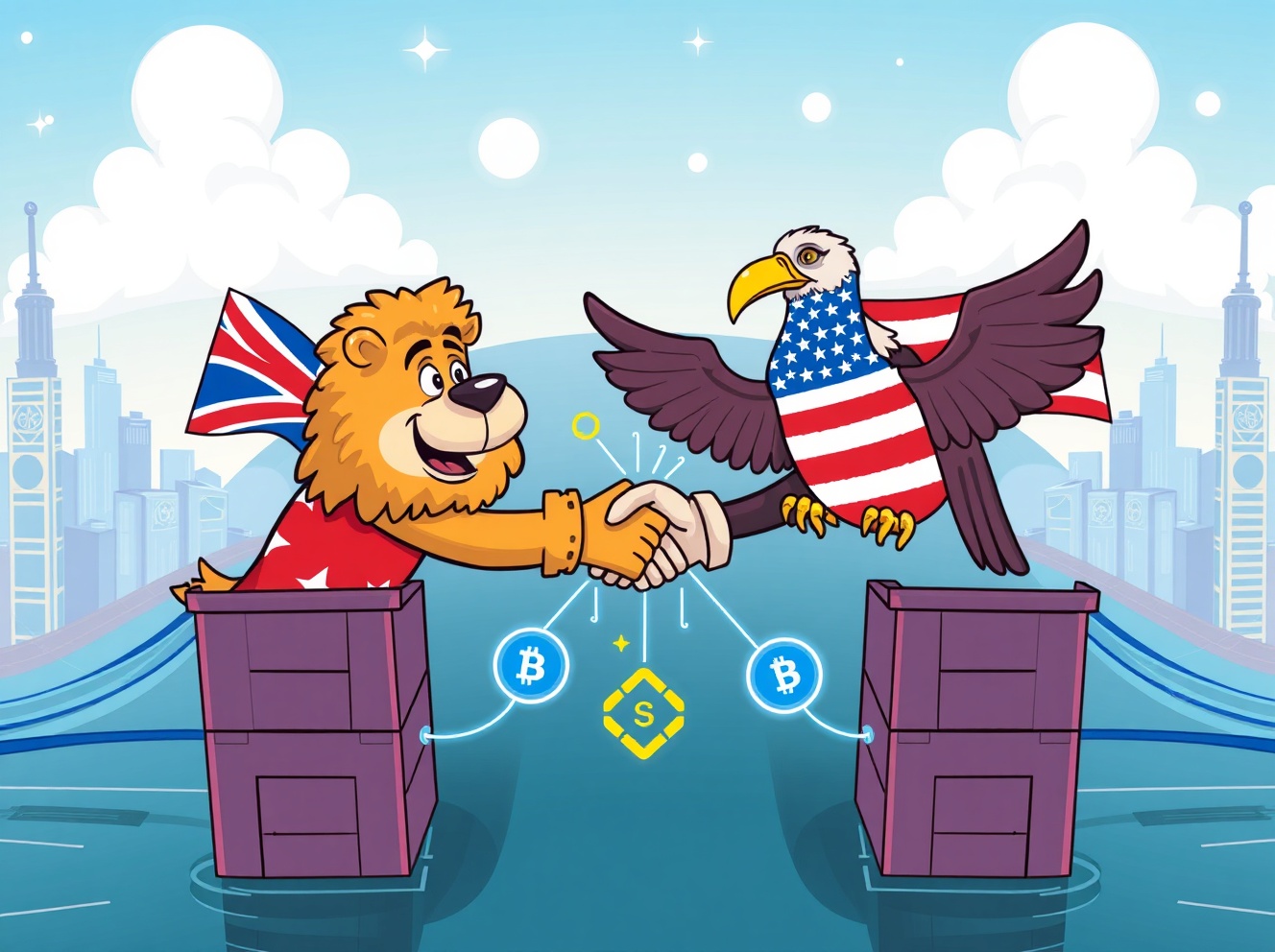Blockchain’s Crucial Role: UK Lobbyists Champion Digital Assets in US Tech Pact
0
0

BitcoinWorld

Blockchain’s Crucial Role: UK Lobbyists Champion Digital Assets in US Tech Pact
The United Kingdom is currently abuzz with a vital push to integrate blockchain technology into its groundbreaking Tech Bridge agreement with the United States. This isn’t just about advanced tech; it’s a strategic move to seize a massive economic opportunity that could redefine future global partnerships. UK lobby groups are making a powerful case, emphasizing the transformative potential of digital assets.
Why is Blockchain a Game-Changer for the UK-US Tech Bridge?
Leading lobbying groups in the UK have recently sent a compelling letter to Secretary of State for Business Peter Kyle. Their core message is clear: excluding digital assets and blockchain from the nation’s Tech Bridge agreement with the United States would be a significant missed opportunity. This agreement aims to foster deeper technological collaboration, and these groups believe blockchain is indispensable to its success.
They argue that specific innovations like stablecoins and tokenization are not just emerging trends but are strategically important to the economic futures of both the UK and the US. Therefore, their inclusion is seen as critical for both nations to maintain a competitive edge in the rapidly evolving global digital landscape.
What Benefits Does Blockchain Integration Offer?
Integrating blockchain technology into such a significant bilateral pact brings a wealth of advantages. This technology, known for its decentralized and secure ledger system, can revolutionize various sectors.
- Enhanced Efficiency: Blockchain streamlines cross-border transactions and data exchange, significantly reducing processing times and operational costs.
- Increased Security: The cryptographic nature of blockchain offers unparalleled security, protecting sensitive data and financial transactions from fraud and cyber threats.
- New Economic Opportunities: It unlocks new avenues for financial innovation, including faster, more transparent digital asset trading and novel tokenization models.
- Greater Transparency: Public or permissioned ledgers can provide an immutable record of transactions, fostering trust and accountability between partners.
Moreover, embracing blockchain-powered solutions would position both countries at the forefront of the digital revolution, attracting investment and talent.
Are There Challenges to Adopting Blockchain in Bilateral Pacts?
While the potential benefits of integrating blockchain are immense, the path isn’t entirely without hurdles. Implementing such advanced technology within a complex international agreement requires careful consideration and strategic planning.
One primary challenge is the need for regulatory harmonization. Both the UK and the US have distinct legal and regulatory frameworks governing digital assets. Aligning these diverse approaches to create a unified, clear, and consistent environment for blockchain innovation is crucial. Furthermore, ensuring interoperability between various blockchain networks and existing legacy financial systems presents a technical complexity that needs robust solutions. Addressing concerns around data privacy, energy consumption, and scalability will also be paramount to ensure widespread and sustainable adoption.
Moving Forward: Actionable Insights for Blockchain Adoption
To truly capitalize on the opportunity presented by blockchain, policymakers in both the UK and the US need to engage in proactive collaboration. This involves more than just discussions; it requires tangible steps toward building a shared digital future.
- Develop Harmonized Regulations: Work towards common standards and clear legal frameworks for digital assets to foster innovation and protect consumers.
- Invest in Infrastructure: Support research and development for robust blockchain infrastructure that can handle the scale of bilateral economic activity.
- Promote Education and Awareness: Educate businesses, financial institutions, and the public about the benefits, risks, and safe use of digital assets and blockchain technology.
- Pilot Programs: Launch joint pilot projects to demonstrate the practical applications and advantages of blockchain in areas like cross-border payments or supply chain management.
By taking these steps, both nations can ensure the Tech Bridge agreement becomes a beacon for future-proof digital cooperation, with blockchain at its core.
In conclusion, the urgent call from UK lobby groups for the inclusion of blockchain in the US Tech Bridge is a forward-thinking and strategically vital move. Embracing digital assets such as stablecoins and tokenization presents a transformative opportunity for both nations to strengthen their economic ties and establish leadership in the global digital landscape. This strategic decision could unlock immense potential, paving the way for a more efficient, secure, and innovative future for transatlantic technological collaboration.
Frequently Asked Questions (FAQs)
What is the UK-US Tech Bridge agreement?
The UK-US Tech Bridge is an initiative aimed at strengthening technological cooperation and collaboration between the United Kingdom and the United States, fostering innovation and economic growth in critical tech sectors.
Why are UK lobbying groups advocating for blockchain inclusion?
Lobbying groups believe that excluding digital assets and blockchain from the Tech Bridge would be a missed opportunity, as these technologies, particularly stablecoins and tokenization, are strategically important for both economies’ future growth and competitiveness.
What are stablecoins and tokenization?
Stablecoins are cryptocurrencies designed to minimize price volatility, typically by pegging their value to a stable asset like a fiat currency. Tokenization is the process of converting rights to an asset into a digital token on a blockchain, allowing for easier trading and fractional ownership.
What are the primary benefits of integrating blockchain into this pact?
Integrating blockchain can lead to enhanced security, greater transparency, increased efficiency in cross-border transactions, and new avenues for financial innovation, providing a competitive edge for both nations.
What challenges might arise from integrating blockchain into the Tech Bridge?
Key challenges include harmonizing diverse regulatory frameworks between the UK and US, ensuring interoperability between different blockchain systems, and addressing concerns related to data privacy and scalability.
Did you find this article insightful? Share your thoughts and help spread the word about the critical role of blockchain in international tech partnerships! Your engagement helps foster important discussions about the future of digital assets.
To learn more about the latest blockchain market trends, explore our article on key developments shaping blockchain technology institutional adoption.
This post Blockchain’s Crucial Role: UK Lobbyists Champion Digital Assets in US Tech Pact first appeared on BitcoinWorld.
0
0
 Manage all your crypto, NFT and DeFi from one place
Manage all your crypto, NFT and DeFi from one placeSecurely connect the portfolio you’re using to start.




